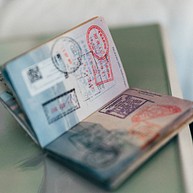
-
![on a bus in Ireland]() Provided by: Sophi Raju/unsplash
Provided by: Sophi Raju/unsplash

Our travel guides are free to read and explore online. If you want to get your own copy, the full travel guide for this destination is available to you offline* to bring along anywhere or print for your trip.
*this will be downloaded as a PDF.Price
€4,95
Busses
The guide was updated:The main bus operators are Bus Éireann, Dublin Bus, Go-Ahead Ireland, and TFI Local Link, each providing comprehensive services across the network.
Navigate your way around Ireland with the help of Transport for Ireland's (TFI) journey planner and route maps. To explore fare details, head over to their fare information page. For frequent bus riders, the TFI Leap Card offers a convenient and cost-saving option, reducing fares by 30% compared to single cash payments. Plus, enjoy additional perks like fare capping and the TFI 90-Minute Fare.
Useful Information
Digital Travel Guide Download
Our travel guides are free to read and explore online. If you want to get your own copy, the full travel guide for this destination is available to you offline* to bring along anywhere or print for your trip.
*this will be downloaded as a PDF.Price
€4,95

Dublin's climate is shaped by the moderating influence of the Gulf Stream, leading to relatively mild conditions year-round. Summer temperatures typically hover between 14 to 16°C (60-70°F), while spring and autumn see averages of around 10°C (50°F). Winter temperatures generally range from 4 to 7°C (30-40°F).
Read more

Passports & Visa Requirements
Ireland’s passport and visa requirements vary for different nationalities: if you are a UK citizen, you can just use official photo identification, whereas if you are an EU citizen, you just need a national identity card. Visitors from EU countries (including Iceland, Norway and Liechtenstein), USA, Australia, Canada and New Zealand, don’t need a visa to visit the Republic or Northern Ireland. South African visitors can visit the Republic of Ireland visa-free, but they need a UK visa in order to enter Northern Ireland. If you're not sure whether or not to apply for a visa, we recommend you contact the embassy or consulate in your country.
Read more

Driving
If you intend to rent a car when you’re in Ireland, make sure to familiarise yourself with the Irish road rules. In particular, pay attention to the speed limits: 120km on motorways; 100km on national roads; 80km on regional and local roads; 50km in a built-up area.
Read more

Taxi
Taxis and Hackney Cabs are available. Taxis can be hailed down in the street, but Hackney Cabs must be booked from offices.
Costs are measured by distance, taxis are equipped with meters.
If you have to be somewhere at a particular time, it is wise to book in advance as offices can be quite busy. All hotels will have a local taxi number.
FreeNow app can be used to book taxis in Dublin, Cork, Galway, Limerick and Waterford.
Read more

Trains
Dublin serves as a hub for Ireland's rail system, featuring three key stations: Connolly, Heuston, and Pearse. Most intercity services operate out of Connolly and Heuston. Iarnród Éireann, the national rail provider, offers efficient and comfortable options for both long-distance and local journeys.
For a more luxurious experience, Railtours Ireland — First Class offers trips that extend to the farthest reaches of Europe, showcasing Ireland's scenic and historical landmarks. Their tours vary in length, from one day to nine days, and cover must-see spots like the Ring of Kerry, the Cliffs of Moher, and the Aran Islands.
Read more

Busses
The main bus operators are Bus Éireann, Dublin Bus, Go-Ahead Ireland, and TFI Local Link, each providing comprehensive services across the network.
Navigate your way around Ireland with the help of Transport for Ireland's (TFI) journey planner and route maps. To explore fare details, head over to their fare information page. For frequent bus riders, the TFI Leap Card offers a convenient and cost-saving option, reducing fares by 30% compared to single cash payments. Plus, enjoy additional perks like fare capping and the TFI 90-Minute Fare.
Read more

Health & Medical Treatment
EU Citizens are entitled to free hospital treatment in a public ward and should obtain a European Health Insurance Card (which replaced the old E111 form) prior to departure.
Private medical insurance is advised for Visitors from non-EU countries.
Read more

Electricity
The standard voltage in the Republic of Ireland is 220 volts. Plugs are 3-pin flat, therefore adapters are required for 2-pin appliances. En-suite bathroom shaving points normally have 110 and 240 volt outlets.
Read more

Post
An Post is Ireland’s national postal service provider. Generally, Post Offices are open from 9 am to 5:30 pm Monday to Friday, and from 9 am to 1 pm on Saturday. In larger towns, the Saturday opening may be extended.
Read more


